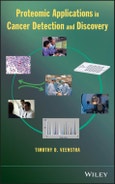Helps researchers in proteomics and oncology work together to understand, prevent, and cure cancer
Proteomic data is increasingly important to understanding the origin and progression of cancer; however, most oncologic researchers who depend on proteomics for their studies do not collect the data themselves. As a result, there is a knowledge gap between scientists, who devise proteomic techniques and collect the data, and the oncologic researchers, who are expected to interpret and apply proteomic data. Bridging the gap between proteomics and oncology research, this book explains how proteomic technology can be used to address some of the most important questions in cancer research.
Proteomic Applications in Cancer Detection and Discovery enables readers to understand how proteomic data is acquired and analyzed and how it is interpreted. Author Timothy Veenstra has filled the book with examplesmany based on his own firsthand research experiencethat clearly demonstrate the application of proteomic technology in oncology research, including the discovery of novel biomarkers for different types of cancers.
The book begins with a brief introduction to systems biology, explaining why cancer is a systems biology disease. Next, it covers such topics as:
- Mass spectrometry in cancer research
- Application of proteomics to global phosphorylation analysis
- Search for biomarkers in biofluids
- Rise and fall of proteomic patterns for cancer diagnostics
- Emergence of protein arrays
- Role of proteomics in personalized medicine
The final chapter is dedicated to the future prospects of proteomics in cancer research.
By guiding readers through the latest proteomic technologies and their applications in cancer research, Proteomic Applications in Cancer Detection and Discovery enhances the ability of researchers in proteomics and researchers in oncology to collaborate in order to better understand cancer and develop strategies to prevent and treat it.
Table of Contents
Preface x
Acknowledgements xii
1 Systems Biology 1
2 Mass Spectrometry in Cancer Research 44
3 Quantitative Proteomics 93
4 Proteome Analysis of Post-translational Modifications 145
5 Characterization of Protein Complexes 196
6 Global Phosphorylation Analysis 242
7 The Search for Biomarkers in Biofluids 281
8 Proteomic Patterns: A New Paradigm in Diagnostics and Therapeutics? 309
9 The Emergence of Protein Arrays 370
10 The Role of Proteomics in Personalized Medicine 413
11 The Critical Role of Bioinformatics 449
12 Future Prospects of Proteomics in Cancer Research 480
Index 516








